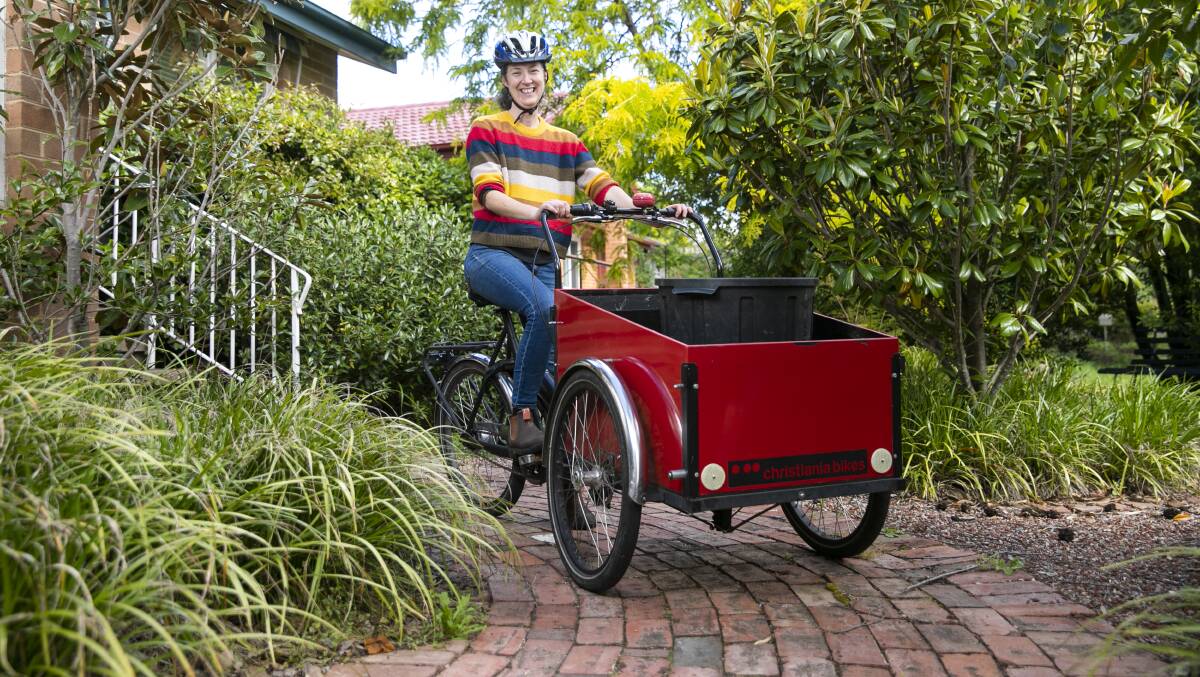
While the government's long-awaited composting program was celebrated in Belconnen this week, a grassroots initiative went about the business it's been quietly going about for several years: taking care of household food scraps in the inner north.
Subscribe now for unlimited access.
or signup to continue reading
More than 160 households in Hackett, Watson and Braddon have signed up to Capital Scraps, paying a monthly fee to have food scraps collected from out front of their houses and apartments on the back of an e-bike.
The food scraps are taken to one of five urban locations which include sites on Limestone Avenue and Haig Park to be turned into compost and used for community projects.
Compost was recently donated to a ParkCare group in Downer for garden beds at one of its new parks, Capital Scraps founder Brook Clinton said.
"Our end product is beautiful, beautiful stuff - really high quality," she said.
The business is currently comprised of just the bike, an electric van, Ms Clinton and three casual employees.
She said the composting service had the capacity to scale up well beyond the three suburbs it currently visited.
READ MORE:
Capital Scraps is currently looking for the next environmentally-conscientious suburb to expand into.
"Anyone can write to us and put their hand up to say, 'I would like composting service in my suburb'. And as soon as we hit the magic number of 50 households we are ready to go," Ms Clinton said.
"We will be looking next year to expand into plenty more suburbs as we see there's enough interest."
Each household pays $15 a month for the weekly service, with subscribers placing their supplied buckets curbside the night before pickup.
The ACT government's composting program being piloted at 5000 households in Belconnen, Bruce, Cook and Macquarie from this week was not a huge concern for the future of her business, Ms Clinton said.
"Canberra ran a similar trial 20 years ago and that didn't progress into a city-wide collections scheme, one of the reasons being that we just didn't have the processing systems in place," she said.
"That's also one of the reasons why we started Capital Scraps and run it the way that we run it.
"We can scale up really gently and gradually according to demand, whereas with the larger-scale commercial facilities there's a bit of a financial risk in that they're paying for a whole lot of engineering and equipment up front.
"If you're a little bit more clever and sophisticated you can handle the waste.
"We actually have a lot of spare capacity at the moment, because each one of our composting units, even though they're only three metres long, they can each accommodate up to 80 households worth of food scraps. That's how high our efficiency is.
"It's really worlds apart from what you might have experienced with backyard composting."
Our journalists work hard to provide local, up-to-date news to the community. This is how you can continue to access our trusted content:
- Bookmark canberratimes.com.au
- Download our app
- Make sure you are signed up for our breaking and regular headlines newsletters
- Follow us on Twitter
- Follow us on Instagram


